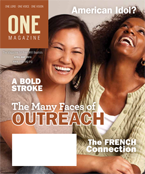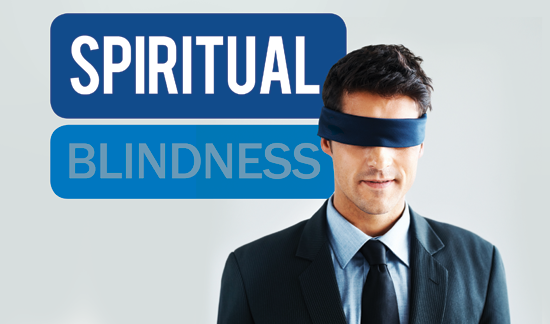
April-May 2013
The Many Faces
of Outreach
------------------
|

intersect, where the bible meets life
Oh Say, Can You See? A Look at Spiritual Blindness
“I can’t see! I can’t see!”
“What’s the matter, kid?”
“I’ve got my eyes closed!”
The old Three Stooges shtick between Curly and Moe always made me chuckle. But over several months last year, the reality of sight loss hit me pretty hard. It’s frustrating not to be able to see clearly. My problem was cataracts, but surgery has taken care of that.
Along with this vision loss issue, a fresh reading of Isaiah alerted me to a deeper, more troubling concern: spiritual blindness.
Sensory images—touching, hearing, and the like—dot the landscape of Isaiah’s oracles. In particular, though, the themes of sight and blindness surface repeatedly. Just start with chapter one, verse one and you’ll see (pardon the pun): “The vision of Isaiah . . . which he saw . . . .” Keep reading passages such as 6:9-10; 29:9-10; 42:18-20; and 56:10 and you’ll see what I mean.
Here and elsewhere, the prophet warned his generation about the danger of not seeing clearly when it comes to spiritual matters. And his warning arches across the ages to reach us. Spiritual blindness plagues God’s people now, at this critical time when the “eyes of our hearts” need to see 20/20.
Consider several factors Isaiah described in relation to spiritual blindness.
-
Spiritual blindness is a real possibility for those who will not see God’s truth. In Isaiah 6:9, the prophet is instructed to announce to the people that they will see, but they will not understand. They will see but not see. They “blind themselves” (29:9) because they do not welcome the truth they would discern. Spiritual blindness is the condition of those unable to see and understand revealed truth because they are unwilling to obey it.
-
Spiritual blindness may affect people in a covenant relationship with God. Those without Christ do not see the truth, of course (2 Corinthians 4:4). But these are God’s people (6:10; 29:1). They have eyes, but don’t see.
-
Spiritual blindness is self-induced at first, but becomes a judgment from God. “Blind yourselves,” the Lord commands in 29:9. As He tells Ezekiel, His people have eyes to see, but do not see because “they are a rebellious house” (12:2). The resistant crowds who heard Jesus’ kingdom parables in Matthew 13 wouldn’t repent and obey; “they have their eyes closed,” He explained. When they persisted in their stubbornness, God blinded their eyes (John 12:38-40). Their situation resembled that of Pharaoh, who initially rejected God’s edict to release the Israelites from bondage in Egypt. When the king persisted in his defiance, however, God hardened Pharaoh’s heart and willed that the stubborn ruler’s fate be sealed in his rebellion. Pharaoh chose his own judgment and God saw that it happened.
-
Spiritual blindness comes upon God’s people who are able to see, but refuse to make the commitment to see. In Isaiah 29:11, God gives His Word to people in a sealed scroll. When a man who is able to read receives it and is told, “Read this,” he refuses and gives the excuse, “I cannot, for it is sealed.” He could break the seal with minimal effort and read the message, but he will not even try. The Lord of the Book calls us to “break the seal,” to engage in serious, disciplined study of Scripture with a view toward understanding and applying it to our lives. When we study the Bible out of love for its author and its message, we truly worship.
-
Spiritual blindness comes upon God’s people who, while not able to see, refuse to learn to see. “When they give the book to one who cannot read,” Isaiah continues in 29:11, “saying, ‘Read this,’ he says, ‘I cannot read.’” Like this one who is spiritually illiterate, God’s people are often lazy, inattentive, and immature in refusing to grow in knowledge. This man couldn’t and wouldn’t even try to apply himself in a serious effort to know the truth. All too often, neither will we. The blindness continues. We get used to the dark.
In the next Intersect: “Oh, Say Can You See? A Look at Spiritual Blindness,” Part Two.
Intersect: Where the Bible Meets Life is a regular column written by Dr. Garnett Reid, a member of the Bible faculty at Welch College. Visit his blog: www.garnettreid.com.
|
|

